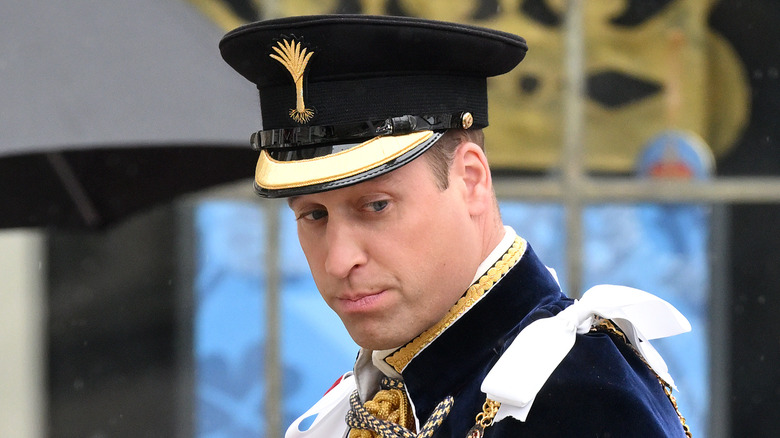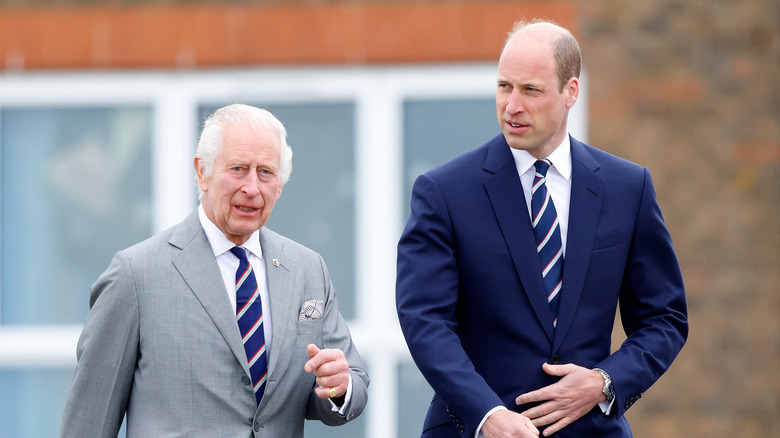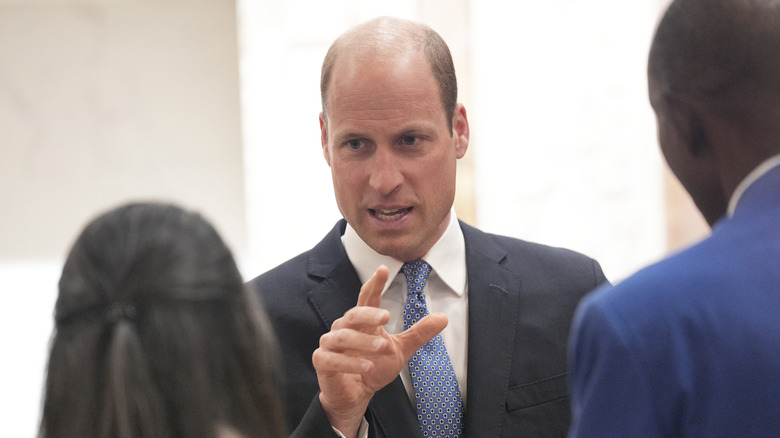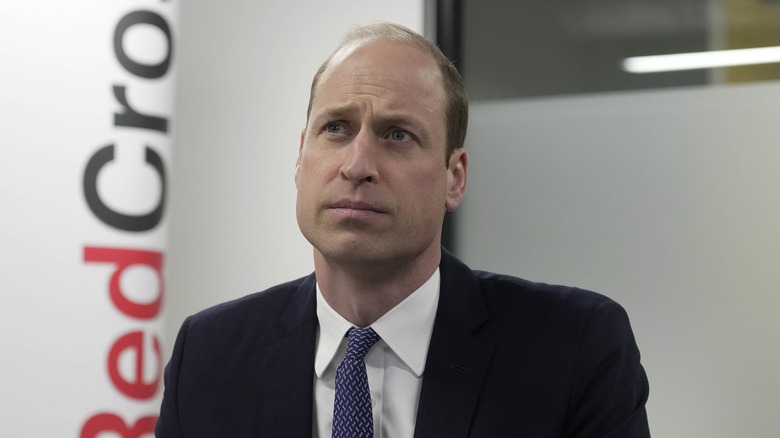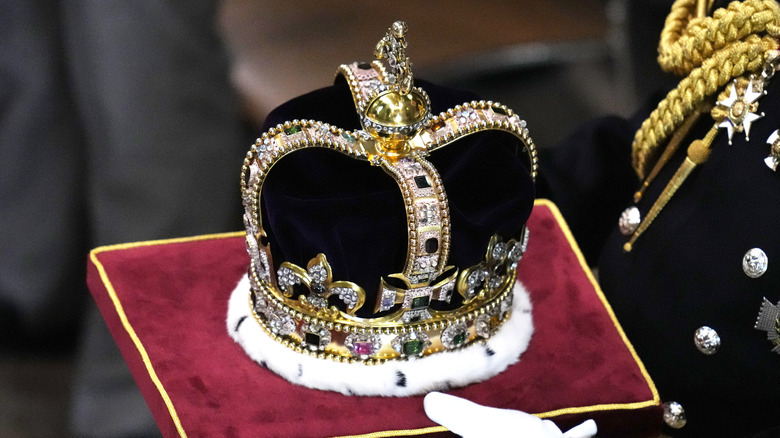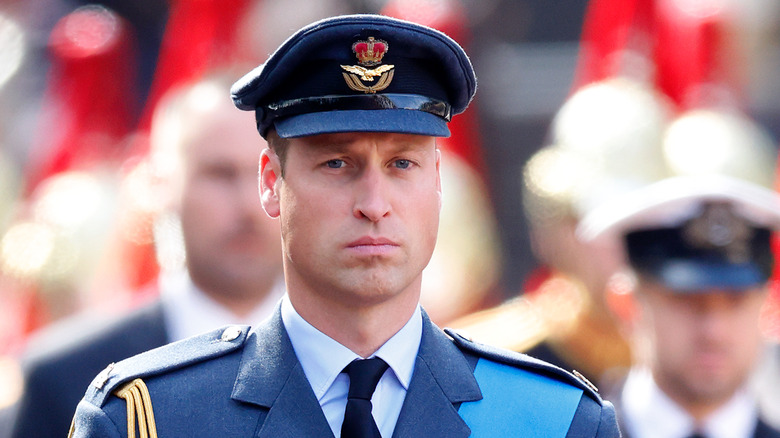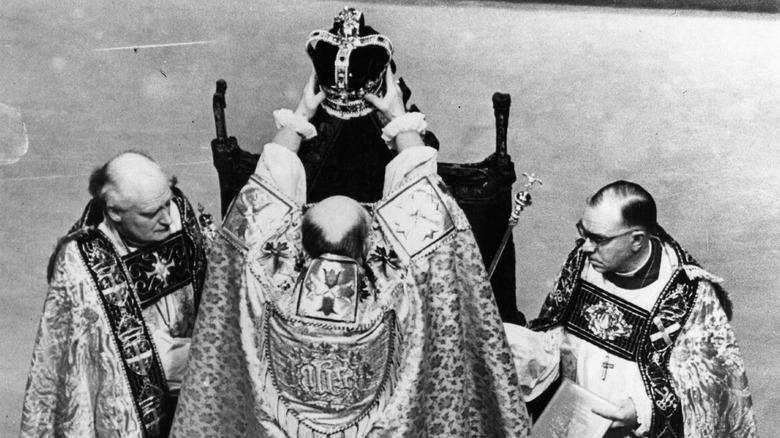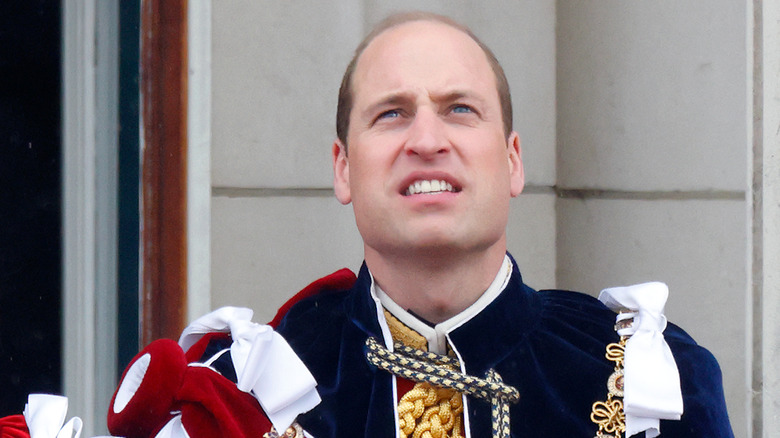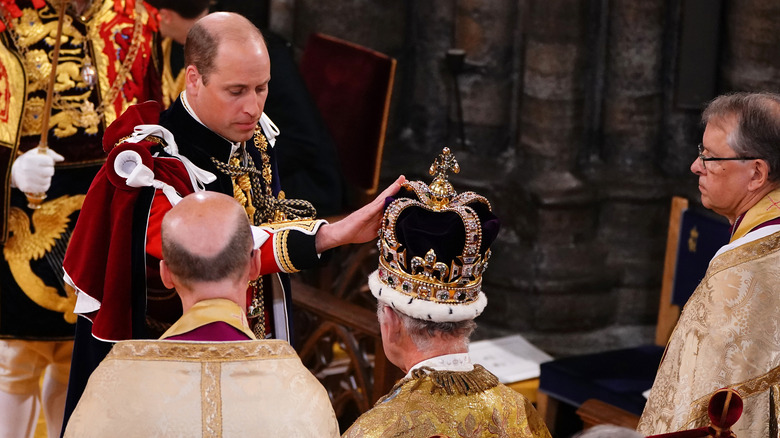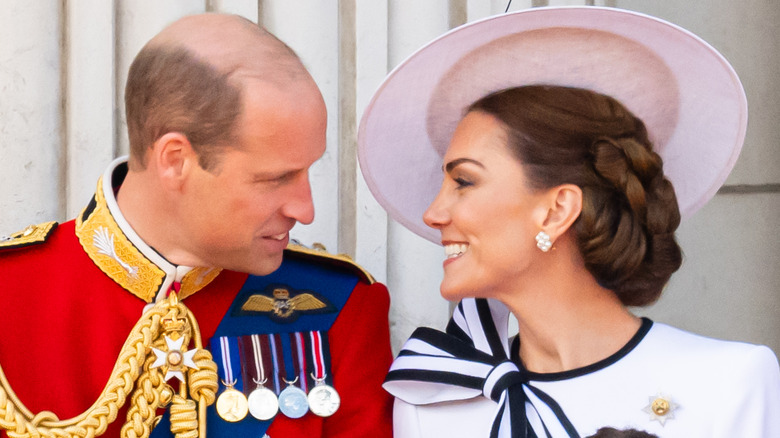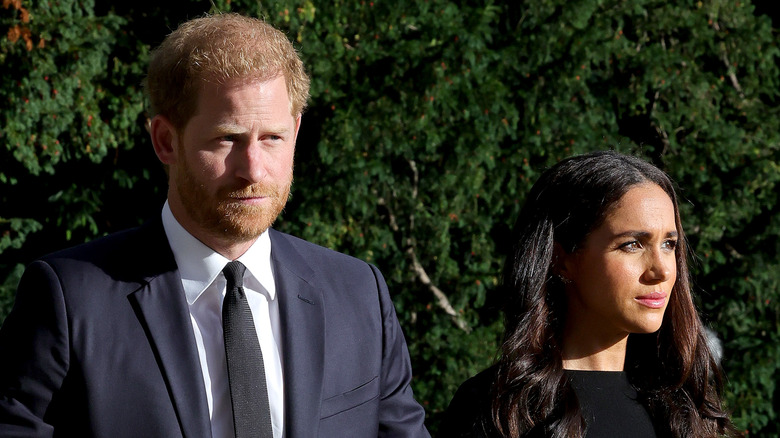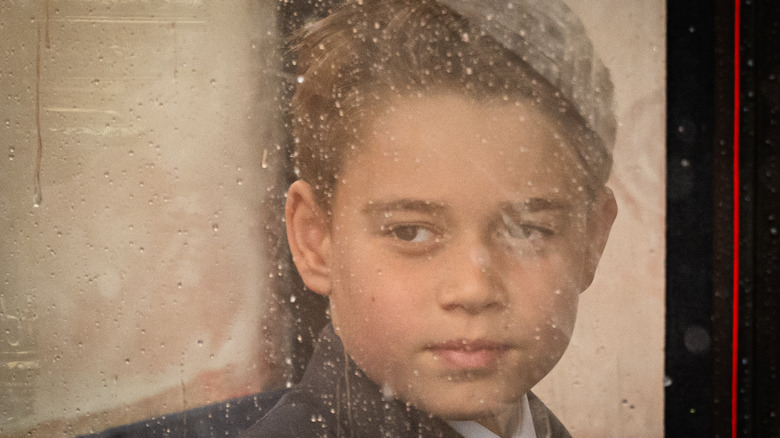Here's What Prince William's Coronation Might Look Like
Prince William was born into a royal life of wealth, privilege, and responsibility. Like his father, King Charles III, and paternal grandmother, Queen Elizabeth II, he's spent his life preparing for the day when he will ascend to the throne as the country's next king. When that happens, William will be the latest in a long line of British monarchs, continuing a history that began in the 10th century with Anglo-Saxon ruler Aethelstan, believed by historians to be the first king of England.
William's father, King Charles III, waited a long time for his time on the throne, becoming king in 2022 at the advanced age of 73, when his mother's death ended her unprecedented 70-year reign. Given the lengthy lifespans of Charles' parents — the queen lived to age 96, while her husband Prince Philip made it to 99 — William may be waiting awhile before taking his turn, although his father's recent health issues may sadly accelerate the timetable. William, however, has made it clear that he's in no hurry. "I certainly don't lie awake waiting for it," he told BBC News of someday becoming king.
When William's time does come, he'll follow tradition by being crowned in an ancient and ritualistic ceremony held in London's Westminster Abbey. However, there are reasons to believe that William's coronation may be unlike any that's preceded it in British history. To find out more, read on for a glimpse at what Prince William's coronation might look like.
King Charles' medical diagnosis sped up coronation planning
Less than a year after King Charles III's coronation, Buckingham Palace made a shocking announcement about his health. According to an official statement issued on February 5, 2024, Charles had been undergoing treatment for an enlarged prostate when doctors discovered what was described as "a separate issue of concern" that led to further testing. Those tests revealed an unspecified form of cancer, with the king immediately undergoing treatment. While the palace hasn't divulged details about how successful that treatment has been, Charles gradually began easing back into public life, which included a June trip to France to take part in a ceremony commemorating the 80th anniversary of D-Day.
It was subsequently revealed that Prince William's wife had also been diagnosed with cancer, and was likewise undergoing treatment. When Princess Catherine attended the annual Trooping the Colour ceremony in June, it was her first royal engagement since her diagnosis announcement.
His father's cancer diagnosis pushed William into a higher-profile role as he took over many of Charles' royal responsibilities. What's more, the uncertainty over Charles' long-term prognosis reportedly sent planning efforts for William's eventual coronation into overdrive. As a royal insider told InTouch Weekly, all options are on the table — including a potential abdication. "Charles can't help but consider stepping down instead, for the sake of the monarchy," said the insider, "meaning William and Kate will be crowned king and queen much sooner than anyone expected."
Plans for William's coronation are taking place in secret
Once King Charles III received his diagnosis, Prince William's team immediately sprang into action to begin planning his coronation; details needed to be put in place immediately to address the worst-case scenario. "He's got a serious battle ahead, and he'll need to focus on beating this cancer," a source told InTouch Weekly of the king, pointing out that the treatment Charles is receiving has taken a lot more out of him than Buckingham Palace is letting on. "The side effects are a lot worse than anyone knows," the source added.
While Charles has been focusing on his cancer treatment, William has stepped up into an advanced version of the role he'll eventually be assuming. "He's taken more control at the palace, staying in constant contact with Charles' aides," the source explained. "He's basically the Firm's point man right now."
According to that source, palace officials are working in secret to ensure that plans have been set in place for William's ascension to the throne if it does end up happening sooner than anticipated. If that were to take place, it could prove wildly inconvenient for the Princess of Wales, who's got a full plate as the mother of three while also undertaking her own cancer treatment. "The timing isn't ideal, but she's ready to step up," the source noted. "They've both been preparing for this for years."
William is reportedly experiencing anxiety about his coronation
Few people know more about the royal family than Tina Brown. Having launched her career in the cutthroat world of British journalism, Brown went on to become editor of Vanity Fair, Tatler, and The New Yorker, before launching the Daily Beast. Through it all, she's assiduously covered Britain's royal family — including writing two royal-related books, "The Diana Chronicles" and "The Palace Papers." That has led Brown to build an extensive network of palace sources, and she shared what she'd learned about the eventuality of Prince William's coronation in an op-ed she wrote for The New York Times.
According to Brown, the Prince and Princess of Wales had hoped that King Charles III's reign would last long enough that they could continue to raise their three children with the same degree of privacy they'd been enjoying. Becoming king and queen, however, would thrust the kids into the spotlight in a far more regular — and far harsher — way than they'd experienced to this point. "The prospect of it, I am told, is causing them intense anxiety," Brown wrote.
Meanwhile, Brown also pointed out that Charles' illness has magnified the pressure that both William and Princess Catherine have been feeling. "Catherine is battling more — much more — than cancer," Brown added. "A tidal wave of premature responsibility is crashing in her and William's direction. Frozen, unready and with Catherine now seriously unwell, the Prince and Princess of Wales await the awesome burden of the crown."
He'll already be king before the coronation takes place
When Prince William's coronation does take place, the ceremony itself will be an expensive, and — judging by his father's — interminably boring affair. It will also be entirely symbolic, because William will already be king. Whether that occurs because of King Charles III's death or his abdication, the power transfers immediately from the monarch to the heir — a system that's summed up in the traditional British proclamation issued upon the death of a monarch: "The king is dead, long live the king."
That was the case for Charles, who became king immediately upon the death of his mother, just as it was for her when her father, King George VI, drew his final breath. That transfer will bump William and his wife up from their current status as Prince and Princess of Wales to king and queen. According to tradition, their firstborn son, Prince George, would then receive the Prince of Wales title, with his eventual bride becoming Princess of Wales.
There is, however, a legitimate purpose for the lengthy gap between assuming the throne and being crowned (which, in the case of King Charles, was eight months). Patricia Treble, author of the Write Royalty newsletter, told CBC News that the reason why there are typically several months between one monarch's death and the successor's coronation is so that people are given ample time to grieve before shifting to the joyful tone of crowning a new king or queen.
He most likely won't change his name when he becomes king
In the past, some British monarchs have changed their names upon ascending to the throne. For example, King George VI — father of Queen Elizabeth II — was born Albert Frederick Arthur George Windsor, and was known to friends as Bertie,, and whose prior title was Albert, Duke of York. The reason for that was because his grandmother, Queen Victoria, had expressly forbidden any of her heirs taking the King Albert moniker, so as not to overshadow her husband, Prince Albert, which compelled him to pick a new one.
Prince William, however, doesn't face that particular problem. As a result, it's expected that when he takes over the throne, he'll be known as King William V. If that is the name he goes with, he'll be the latest in a long line of namesakes going all the way back to William the Conqueror, who ruled England from 1066 until 1087, at which point his son, William II, took over, reigning until 1100. The next time that name was used was several centuries later, with William III (1689-1702), and then, a few centuries later, William IV (1830-37).
Then again, William still has the option of picking a whole other name entirely — he might opt to evoke Camelot by dubbing himself King Arthur, for example — but it's far more likely he'll take the path of least resistance and stick with his given name.
He's planning to modernize the ancient ritual
While Britain has been holding coronation ceremonies for its monarchs for well over a thousand years, not all have had coronations. Thirteen-year-old Edward V was king for just two months before being murdered in the Tower of London, before he could be crowned, while Edward VIII abdicated before his coronation could be held.
Speaking with CBC News, royal historian Carolyn Harris noted that William IV, who reigned from 1830 until 1837, contemplated scrapping his coronation altogether, feeling the expense was an unnecessary indulgence that sent the wrong message during a period of economic hardship. Harris wondered whether the current Prince William might have similar thoughts. "It's likely that the future William V, like William IV, may well question whether a coronation needs to take place on a lavish scale," she said.
Whether William intends to tone down his ceremony remains an open question, but there have been reports indicating that he plans to introduce some updates. As a source told The Times, William "is really thinking, how do we make this coronation feel more relevant in the future? He is mindful of the fact that in 20 years' time, or whenever his time comes, how can the coronation be modern but also unifying to the nation and the Commonwealth?" Another source confirmed that report, telling People, "The prince and princess are keen to do things in their own way."
He'll likely skip a key part of the ceremony
One segment of King Charles III's coronation stirred up controversy: the traditional "homage to the people." As The Guardian reported, that involved calling upon the British public to swear their allegiance to the new monarch. Charles, however, insisted on toning it down just a touch, with the Archbishop of Canterbury instead issuing an invitation to the British public, not an outright call.
That subtle distinction didn't make the oath itself — which hadn't been publicly uttered since Queen Elizabeth II's coronation seven decades earlier — any less controversial: "I swear that I will pay true allegiance to your majesty, and to your heirs and successors, according to law. So help me God." Charles' use of that outdated wording rankled the members of Republic, a U.K. campaign group, and the organization issued a statement blasting the royals for being so painfully out of touch. "This oath plan has been widely mocked, and the chances of more than 0.001% of the country taking this seriously are zero," the statement read, insisting it should be the monarch swearing allegiance to the people, not the other way around. "This kind of nonsense should have died with Elizabeth I, not outlived Elizabeth II."
A royal source told The Times that it's likely Prince William may well see fit to eliminate the oath entirely when it's his turn to be crowned at Westminster Abbey. "I think his coronation will look and feel quite different," the source explained.
Questions have arisen about whether he'll take over as head of the Church of England
British coronation ceremonies are infused with religious symbolism, and there's good reason for that: in addition to inheriting his mother's crown, Charles took over her role as head of the Church of England. "It's very much a Christian phenomenon," royal expert Patricia Treble told CBC News of the coronation ritual. "It confers God's grace onto a ruler."
It began when Henry VIII broke from the Roman Catholic Church over Pope Clement VII's refusal to grant him a divorce from one of his wives, deciding instead to create his own church and place himself in charge of it. That tradition has carried on ever since, but there's reason to believe Prince William — who is reportedly not particularly religious — may become the first British monarch who won't head the Church of England. "In royal circles, it is no secret that [William] does not share the king's sense of the spiritual, let alone the late queen's unshakable devotion to the Anglican church," Robert Hardman wrote in his book, "The Making of a King: King Charles III and the Modern Monarchy," excerpted in the Daily Mail.
Appearing on Sky News Australia, royal biographer Angela Levin said of William, "He's thinking that when the time comes, he doesn't want to be leader of the church ... and it would be the first time since Henry VIII [that a monarch] wasn't in charge of the religion of the country."
Princess Catherine will receive a new title at her husband's coronation
When an heir to the throne of Britain ascends to the throne, the new monarch receives a very specific title. For King Charles III, that official title is Charles the Third, by the Grace of God of the United Kingdom of Great Britain and Northern Ireland and of His other Realms and Territories, King, Head of the Commonwealth, Defender of the Faith. His wife, the former Camilla Parker Bowles, was briefly referred to as queen consort, before becoming known simply as Queen Camilla.
When Prince William is crowned king at his coronation, his wife, Catherine, Princess of Wales, will also gain a new title. While there has been some speculation that she'll become Queen Catherine VI (referencing the five other Queen Catherines in British history), royal historian Marlene Koenig told Hello! that she will simply be known as Queen Catherine, sans roman numeral. The reason, she explained, is that she will technically be queen consort, and only a regnant (i.e. a queen who rules in her own right) can use a regal number — but will still be referred to as queen. "The wife of the king is by tradition a queen," Koenig explained.
If William dies before Catherine, she will become known as the Queen Mother; if, for some reason, someone other than one of their three children becomes monarch, she'll be granted the title Queen Dowager.
Will Harry & Meghan be invited?
One big and still unanswered question is whether Prince Harry and his wife, Meghan Markle, will be invited to Prince William's coronation. While it's traditional for the siblings of a new monarch to be in Westminster Abbey attending the coronation, the well-publicized royal rift between Harry and William places that particular historical convention in uncharted waters.
While there's the remote possibility that the brothers could mend their fractured relationship ahead of William's eventual coronation, the current Prince of Wales isn't counting on it. That's the opinion of royal correspondent Roya Nikkhah, who discussed whether the Duke and Duchess of Sussex would be welcome at the coronation of King William. "If we were to have another coronation in the next few years, would Harry be there? I don't think William would invite him," Nikkhah declared during a conversation with Kate Mansey on their podcast, "The Royals with Roya and Kate." "And I don't think Harry would come."
That's backed up by a friend of Prince William, who told the Daily Beast that it's highly unlikely Harry and Meghan will be in attendance for the big day. "It's very clear that William and Kate are now extremely important members of the institution, so their view on Harry, which is basically the further away the better, will have to be taken into account," the source explained. "Put it this way: I don't think anyone expects Harry to get an invite to William's coronation."
Prince George will play a big role in his father's coronation
When King Charles III was crowned at his coronation, Prince William played a significant role in the ceremony. As People reported, he assisted Baroness Merron and various bishops placing the Stole Royal and the Robe Royal on his father before St. Edward's Crown was set atop his head. After the crown was in place, William then knelt before Charles before reciting a pledge and kissing his cheek. "I, William, Prince of Wales, pledge my loyalty to you and faith and truth I will bear unto you, as your liege man of life and limb. So help me God," the future monarch said.
When it's William's turn, Prince George will be next in line to the throne, and will then fulfill those coronation duties, assisting with the robe and reciting that same pledge to William.
Of course, the future King George received his first taste of what he'll someday experience when he participated in Charles' coronation, tasked with holding his grandfather's ceremonial robes in the procession. "This is a really big moment for Prince George," said royal contributor Victoria Murphy told ABC News. "All eyes will be on him because he is there as a future king. He's not just there supporting his grandfather. He's there seeing before him what, unless things change, one day he could be at the center of."
